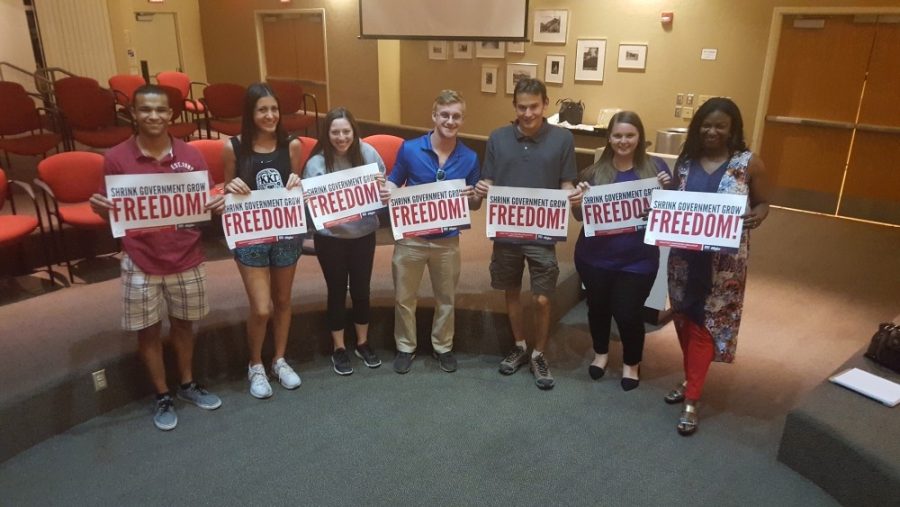The politicization of free speech on college campuses around the country threatens the integrity of our First Amendment rights.
At universities across America, a clash of ideologies is underway in an attempt to define what free speech really is; from the violent protests following the cancellation of a divisive speaker at Berkeley to the continued discussions across the nation regarding an increasingly political college atmosphere, the straightforward exchange of ideas is not itself a straightforward idea.
American universities have long been the vanguard of intellectual and political movements that may sometimes flow against mainstream cultural currents. A long and well-recorded history of protest and idealism is ironically the same force that has driven its inheritors into the armed camps which threaten peaceful discourse today.
The University of California Berkeley was the site of a protest in the wake of divisive conservative commentator Ann Coulter, who was un-invited to speak on campus following walkouts, opposition and threats of violence. Among the clashing protestors, a cultural microcosm can be seen that may indicate what has changed in our society.
On one side, the progressive’s protest against Ann Coulter make sense. Her opponents recognize that what she is saying is within her rights but is not something they wish to encourage. On the other side, the argument for her appearance is just as easily justified. In the wake of the controversy, the university decided they would rather avoid uncomfortable discussion than encourage debate on campus.
RELATED: Column: What high school doesn’t prepare you for
Looking at the way this controversy unfurled, it can be easy to dismiss one side as supporters of racism or the other side as the opponents of free speech. But to accept either is to fall victim to the same trap that has caught universities unaware and created volatile powder kegs on our campuses.
The environment of opposition born from the chaos of the 60s and 70s has become an enemy of discussion. No longer does liberty come from a desire to discuss opinions with colleagues who might disagree with you, but from a wish to find people who would never disagree with you. When your entire environment aligns with your political perspective, you may find your worldview being constantly confirmed and rarely questioned.
So when trying to understand just how someone you have never met might disagree with you so fundamentally, try to imagine them thinking the same about you. Modern liberalism is just as tainted as modern conservatism by this positive feedback loop in which you isolate yourself along party lines. Once your ideology becomes an intrinsic part of your personality, then finding speech that disagrees with you becomes alien and even hostile.

On April 19, the Ayn Rand Institute hosted a panel discussion about free speech on campus, and invited representatives from Skeptic Magazine and Turning Point USA to get their input. Both the Ayn Rand Institute and Turning Point USA are right-leaning organizations, while Skeptic Magazine is more left-leaning, allowing an element of open-mindedness at a time when such discussions are often plagued by protests and dysfunction.
The session focused on opposing the limiting of free speech — especially unpopular speech — and encouraged students to rise above the status quo of discussion. However, overtly ideological events such as these run the risk of politicizing freedom of speech at a time when even the whiff of politics can turn off potential listeners or those who may be on the fence.
Rather than approaching the contemporary obsession with controlling speech as a left-right problem, it must instead be addressed as an inclusivity problem. It isn’t that liberals hate freedom and conservatives hate equality; it’s that both sides find themselves surrounded only by others like them and can no longer hear those who disagree with them.
RELATED: Column: Freedom of speech is an endangered species on colleges campuses across the nation
Modern liberalism places a strong emphasis on making sure that what people are saying is actually good for a public debate — namely that it avoids blatantly insulting or attempting to silence others. The flaw is that once the initial step toward regulating unpopular opinions is made, it becomes a slippery slope of further limitations until only the culturally acceptable is allowed.
On the other side, “small government” conservatives want to ensure that all speech is free and open, without realizing their opponent in the discussion may also be coming from somewhere justifiable and reasonable. In other words, while those in favor of fewer restrictions on speech may open the debate to more people, they’re also incapable of recognizing the opposing side, who fear the return of equally restrictive, racist and authoritarian discourse silencing others.
The tragedy of the modern campus is that both sides have taken up the mantle “defender of free speech,” without realizing that the greatest defender of liberty is the practice of philosophical and intellectual empathy.
Follow Alec Scott on Twitter.









